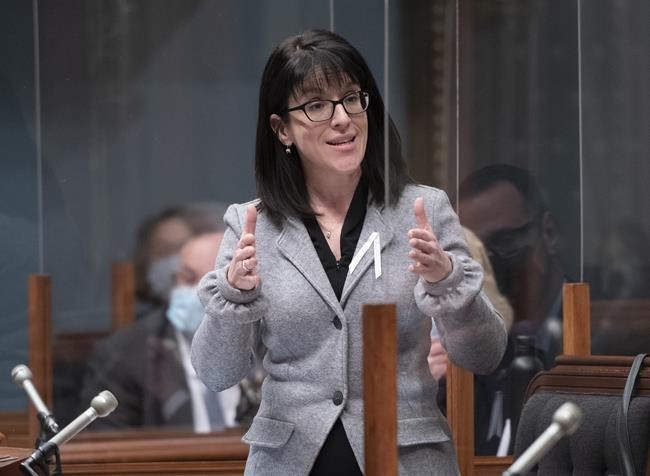MONTREAL — Quebec's common front of public sector unions are gearing up for a one-day strike on Nov. 6 as the province prepares to make a fresh contract offer this weekend.
The unions did not confirm or deny the date when asked to comment on Wednesday, but they received a strike mandate from members on Oct. 17.Â
Certain hospitals and regional health boards confirmed they have started receiving strike notices for Nov. 6, with at least one of those institutions confirming it.
Treasury Board president Sonia LeBel is set to table a new contract offer on Sunday in Quebec City, attempting to advance negotiations that have been going on since the beginning of the year.
On Wednesday, Quebec Premier François Legault spoke to Centrale des syndicats du Québec (CSQ) members demonstrating near the national assembly, where he mentioned that a fourth offer — one he described as "enhanced" — would be tabled.
The common front is made up of four main unions, known by their French initials CSQ, CSN, APTS and FTQ, representing some 420,000 members in the health, education and social services sectors.
The strike mandate has the support of 95 per cent of members and calls for one-day walkouts before an indefinite strike begins. A fifth union not part of the common front, the FAE, has also voted in favour of an unlimited strike, but has not set a date.
The unions are seeking a three-year contract with annual increases tied to the inflation rate — two percentage points above inflation in the first year or $100 per week, whichever is more beneficial, followed by three points higher in the second and four points higher in the third year.
The Quebec government is offering an increase of nine per cent over five years, as well as a lump-sum payment of $1,000 in the first year and other targeted increases that bring the total offer to 13 per cent over five years.
LeBel told reporters in Quebec City the decision to strike is up to the unions.
“What I have wanted since the start of this negotiation, what drives me, what motivates me, is to be able to settle as quickly as possible and settle with an improvement in services to the population," LeBel said.
LeBel is also expected to announce what will happen to bonuses paid to thousands of provincial employees. They were expected to end on March 31 but were extended first to Sept. 30 and again to Oct. 15. They are paid out to certain workers including nurses, psychologists, and specialized workers.
Legault reiterated his desire to give larger salary increases "in shifts that are more difficult to fill", particularly at night, on weekends and in remote regions.
"We cannot say: 'We're giving a 21 per cent increase to everyone and, on top of that, we're giving night bonuses,' we have to find a balance according to the government's ability to pay," Legault said.
During the exchange, a union member reminded Legault that Quebec politicians voted to give themselves a 30 per cent salary increase. The government also offered Quebec provincial police officers 21 per cent over five years — an offer that was rejected last month.
This report by The Canadian Press was first published Oct. 25, 2023.
— With files from Caroline Plante in Quebec City.
Lia Lévesque, The Canadian Press




